Tokito Oda is defending his Australian Open title.
When Yui Kamiji first picked up a racquet, it was because she wanted to play with her sister.
Kamiji was born with spina bifida, but could walk a little when she was young.
During a hit with her sister, she saw someone on a nearby court playing from a wheelchair.
"He moved really well, and I thought if I use a wheelchair, I can do more," she told the ABC.
"It was really fun to enjoy with my sister. I didn't want to play any tournaments … I couldn't believe my life has changed like that."
The pinnacle of her career came last year at the Paris 2024 Paralympic Games, where she defeated long-time rival and 23-grand slam champion Deide de Groot to win the gold medal for Japan.
It was a moment so overwhelming that the 30-year-old was left shell-shocked and sobbing.
"I couldn't move… I was crying and so emotional," she said.
"People trust me and believe in me to get the gold medal."
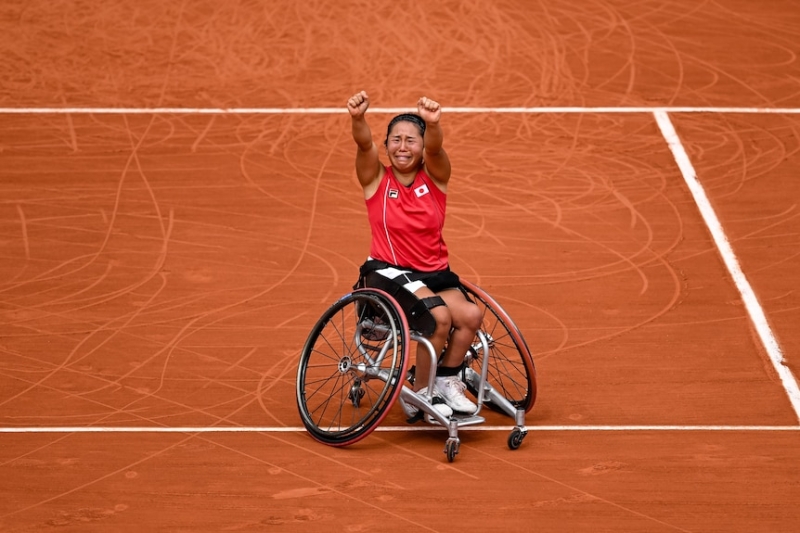
Yui Kamiji of Japan celebrates winning match point against Diede de Groot in the gold medal match last year. (Getty Images: Daniel Kopatsch)
The Paralympics was also an emotional moment for her compatriot, Tokido Oda, the teen sensation who has won all four grand slams and a gold medal.
In Paris he removed the wheels from his chair and collapsed on his back on the French clay, basking in the win.
"It made me realise that I was born for this moment," he told Japanese reporters after the match.
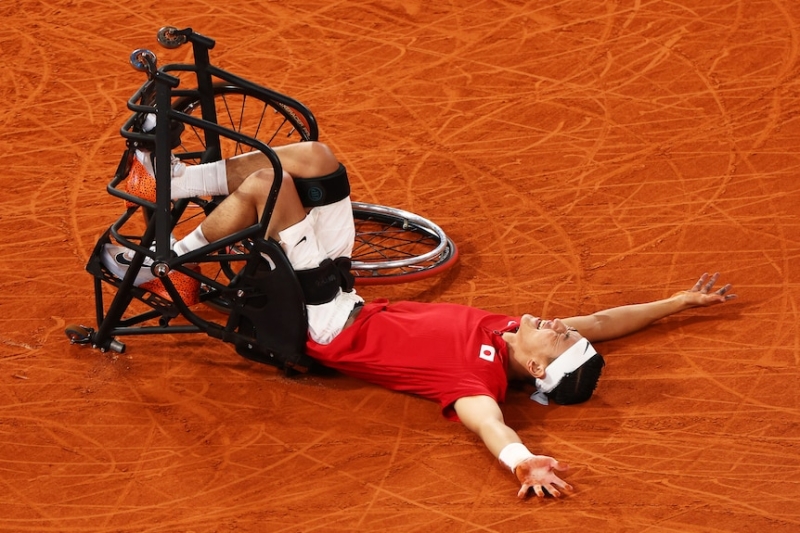
Tokito Oda became the youngest player to win a career grand slam and the gold medal at the 2024 Paris Paralympic Games. (Getty Images: Dean Mouhtaropoulos)
Both Kamiji and Oda are world number one in their sport, and they have their sights set on the Australian Open title after triumphing in their semifinals yesterday.
Japanese legend inspires
The Dutch have long dominated the wheelchair tennis arena, but Japan has also emerged as a formidable force.
"We are not having a long history, but we have many histories," Kamiji said, adding a key to Japan's success was in the trailblazing wheelchair tennis legend Shingo Kunieda.
"He showed us [how to] dream and how to improve not just as a player, but as a person. Now everyone wants to try wheelchair tennis," Kamiji said.
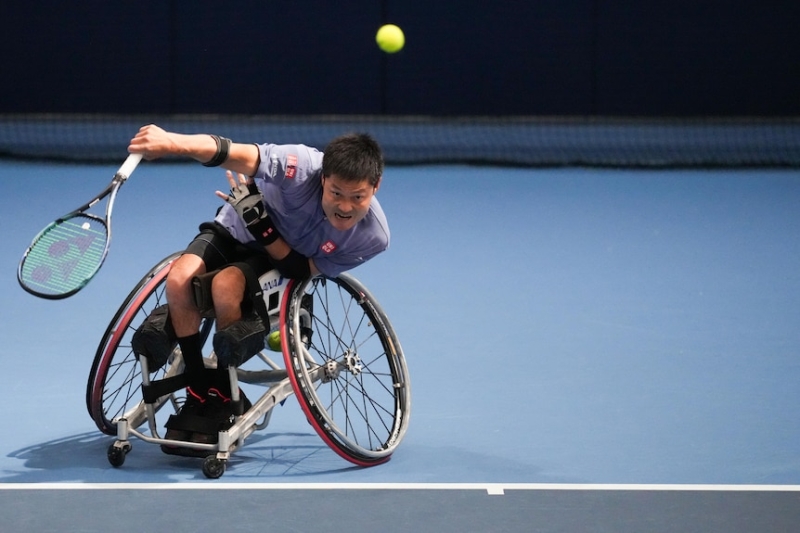
Shingo Kunieda has inspired the next generation of Japanese wheelchair tennis players. (Getty Images: Moto Yoshimura/)
Kunieda was an inspiration for Oda too; when Oda underwent surgery for bone cancer at the age of nine, he watched a video in hospital of Kunieda winning the London 2012 Paralympic gold medal match.
British sports scientist Vicky Tolfrey said having a great role model can infuse enthusiasm and lead to a country's broader success in the sport, which was also the case in The Netherlands.
"Players like Shingo Kunieda, widely considered one of the greatest wheelchair tennis players of all time, have inspired a new generation of players," she told the ABC.
"I suspect that he has inspired young athletes (like Oda) and you now see great sponsorships and media coverage, further promoting the sport."
Keys to success
But Tolfrey, a professor of Applied Disability and Para Sport at Loughborough University in the UK, said there were other elements to Japan's success.
"Japan's dominance in wheelchair tennis can be attributed to a combination of cultural, structural, and individual factors," she said.
Want more? Tune in to The ABC Tennis Podcast

She said there is strong institutional support for para sports more broadly, and that the Japan Wheelchair Tennis Association has played a crucial role in nurturing talent from the grassroots level.
"I have visited the spinal cord injury rehabilitation centres in Japan and staff work hard, I suspect that the dedication and discipline also aligns well with the demands of professional sports," she said.
"Wheelchair tennis is a highly skilled sport — as you must coordinate wheelchair propulsion while holding a tennis racket — fine tuning the handrim-propulsion-user interaction.
"Most importantly, an area that I work in is wheelchair ergonomics and Japan's expertise in technology and engineering has also played a role in creating advanced, lightweight, and customised wheelchairs for athletes, providing them with a competitive edge."
She said Japan had made "significant strides in promoting inclusivity and accessibility in sports, ensuring that athletes with disabilities have opportunities to train and compete".
Eyes on the prize
Both Oda and Kamiji triumphed in their semifinals yesterday.
Oda was dominant in his 6-1, 6-1 victory over Martin De la Puente, circling like a shark as he awaited the Spaniard's serve.
He cast a mesmerising figure eight with his wheels before ripping forehand winners crosscourt and backhands heavy with topspin.
Racing to a short ball, he put it away with a precise backhand slice that was too good for De la Puente.
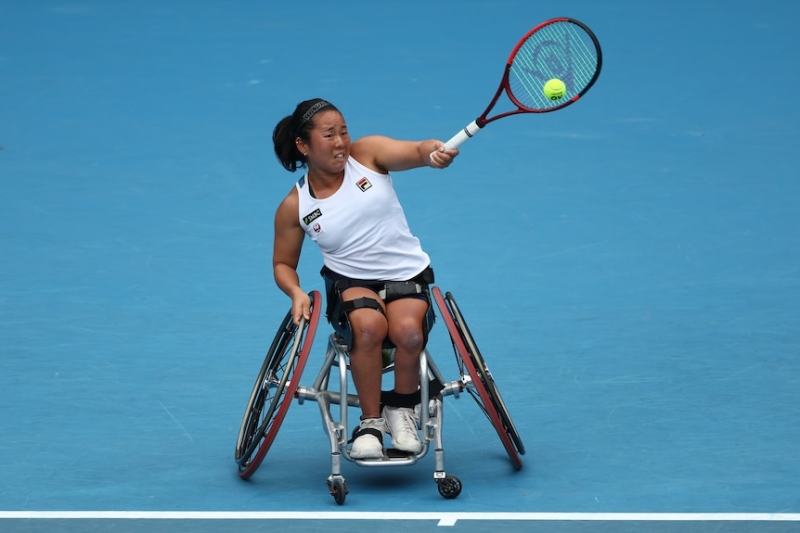
World number one Yui Kamiji is in the finals of the women's wheelchair tennis division at the Australian Open. (Getty Images: Graham Denholm)
Kamiji was locked in a closer battle with China's Xiaohui Li.
She was down a break in the first set, but eyeing a "little revenge", she took away Li's rhythm to secure a 6-4, 6-1 victory.
Tomorrow they will face off against the world number twos in wheelchair tennis; Oda against Britain's Alfie Hewett in a rematch of last year's final and Kamiji against Aniek Van Koot of The Netherlands, a rematch of their 2020 showdown.
Oda was ready for the rematch.
"Let's rock," he said in his post-match interview.
Dutch great de Groot claims sixth Australian Open
Photo shows Diede de Groot holds the 2004 Australian Open trophy after winning the women's wheelchair singles final.
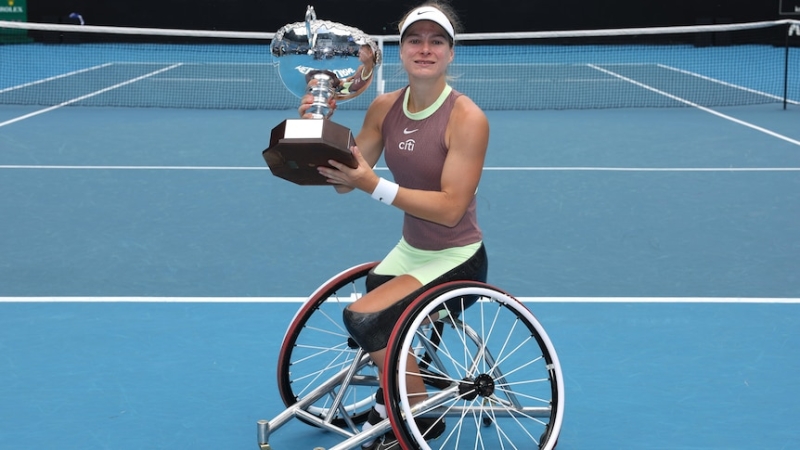
With de Groot sidelined as she recovers from hip surgery, Kamiji is well placed to seize the title. Kamiji said she enjoyed the challenge posed by de Groot, and their rivalry had lifted the level of women's wheelchair tennis.
Kamiji has won the Australian Open twice before, but lost out to the Dutch player in the past two years. But her goal for this year is to lift the elusive Wimbledon title.
Professor Tolfrey said that athletes with lesser impairment in the upper extremities of their bodies will excel in wheelchair tennis.
She hoped in the future The International Tennis Federation (ITF) would introduce other classes of competition beyond the current open and quad class — the latter in which Australian Dylan Alcott excelled.
The sport is expanding, with bigger draws and more wheelchair events at the Australian Open this year, including qualifying rounds and junior competitions.
"It's going to be unreal. The fact that there are junior boys and girls here, so they get that progression to be able hopefully one day play in the main draw and get the same experience that I've been lucky to do in a wheelchair," Alcott said.
The total prize money across wheelchair events is $1.6 million, with $109,000 for the winners of the men's, women's and quad divisions.
As Kamiji readies for her final tomorrow, she is eager to put on a good show for the crowds.
"I would like to show the people how we play wheelchair tennis, and for people to enjoy it," she said.
"I'm really appreciative to people who started wheelchair tennis, and now we are here.
"For the next generation, I would like to show them another history."
ABC Sport Daily podcast

The ABC of SPORT
Sports content to make you think… or allow you not to. A newsletter delivered each Saturday.Your information is being handled in accordance with the ABC Privacy Collection Statement.

